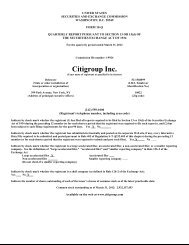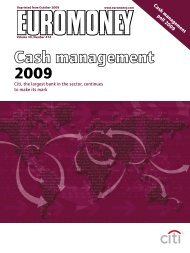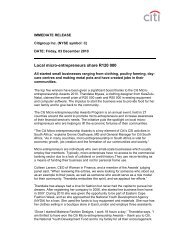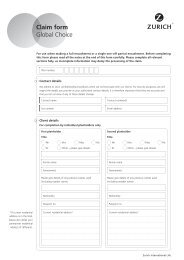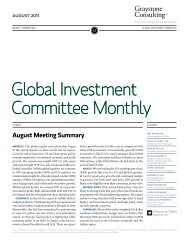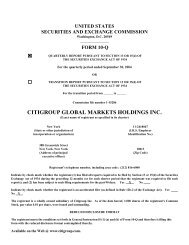Citigroup Inc.
Citigroup Inc.
Citigroup Inc.
Create successful ePaper yourself
Turn your PDF publications into a flip-book with our unique Google optimized e-Paper software.
The Company sponsors two kinds of TOB trusts: customer TOB trustsand proprietary TOB trusts. Customer TOB trusts are trusts through whichcustomers finance investments in municipal securities. Residuals are heldby customers, and floaters by third-party investors. Proprietary TOB trustsare trusts through which the Company finances its own investments inmunicipal securities. The Company holds residuals in proprietary TOB trusts.The Company serves as remarketing agent to the trusts, facilitatingthe sale of floaters to third parties at inception and facilitating the reset ofthe floater coupon and tenders of floaters. If floaters are tendered and theCompany (in its role as remarketing agent) is unable to find a new investorwithin a specified period of time, it can declare a failed remarketing (inwhich case the trust is unwound) or it may choose to buy floaters into its owninventory and may continue to try to sell them to a third-party investor. Whilethe level of the Company’s inventory of floaters fluctuates, the Companyheld none of the floater inventory related to the customer or proprietary TOBprograms as of December 31, 2010.Approximately $0.6 billion of the municipal bonds owned by TOB trustshave a credit guarantee provided by the Company. In all other cases, theassets are either unenhanced or are insured with a monoline insurancecompany. While the trusts have not encountered any adverse credit eventsas defined in the underlying trust agreements, certain monoline insurancecompanies have experienced downgrades. In these cases, the Company hasproactively managed the TOB programs by applying additional insurance onthe assets or proceeding with orderly unwinds of the trusts.If a trust is unwound early due to an event other than a credit event onthe underlying municipal bond, the underlying municipal bond is soldin the market. If there is an accompanying shortfall in the trust’s cashflows to fund the redemption of floaters after the sale of the underlyingmunicipal bond, the trust draws on a liquidity agreement in an amountequal to the shortfall. Liquidity agreements are generally provided tothe trust directly by the Company. For customer TOBs where the residualis less than 25% of the trust’s capital structure, the Company has areimbursement agreement with the residual holder under which the residualholder reimburses the Company for any payment made under the liquidityarrangement. Through this reimbursement agreement, the residual holderremains economically exposed to fluctuations in the value of the municipalbond. These reimbursement agreements are actively margined based onchanges in the value of the underlying municipal bond to mitigate theCompany’s counterparty credit risk. In cases where a third party providesliquidity to a proprietary TOB trust, a similar reimbursement arrangement ismade whereby the Company (or a consolidated subsidiary of the Company)as residual holder absorbs any losses incurred by the liquidity provider. As ofDecember 31, 2010, liquidity agreements provided with respect to customerTOB trusts, and other non-consolidated, customer-sponsored municipalinvestment funds, totaled $10.1 billion, offset by reimbursement agreementsin place with a notional amount of $8.6 billion. The remaining exposurerelates to TOB transactions where the residual owned by the customer isat least 25% of the bond value at the inception of the transaction and noreimbursement agreement is executed. In addition, the Company hasprovided liquidity arrangements with a notional amount of $0.1 billion forother unconsolidated proprietary TOB trusts described below.The Company considers the customer and proprietary TOB trusts to beVIEs. Customer TOB trusts were not consolidated by the Company in priorperiods and remain unconsolidated upon the Company’s adoption of SFAS167. Because third-party investors hold residual and floater interests in thecustomer TOB trusts, the Company’s involvement includes only its role asremarketing agent and liquidity provider. The Company has concludedthat the power over customer TOB trusts is primarily held by the customerresidual holder, who may unilaterally cause the sale of the trust’s bonds.Because the Company does not hold the residual interest and thus does nothave the power to direct the activities that most significantly impact thetrust’s economic performance, it does not consolidate the customer TOBtrusts under SFAS 167.Proprietary TOB trusts generally were consolidated in prior periods.They remain consolidated upon the Company’s adoption of SFAS 167. TheCompany’s involvement with the Proprietary TOB trusts includes holding theresidual interests as well as the remarketing and liquidity agreements withthe trusts. Similar to customer TOB trusts, the Company has concluded thatthe power over the proprietary TOB trusts is primarily held by the residualholder, who may unilaterally cause the sale of the trust’s bonds. Becausethe Company holds residual interest and thus has the power to direct theactivities that most significantly impact the trust’s economic performance, itcontinues to consolidate the proprietary TOB trusts under SFAS 167.Prior to 2010, certain TOB trusts met the definition of a QSPE and werenot consolidated in prior periods. Upon the Company’s adoption of SFAS167, former QSPE trusts have been consolidated by the Company as residualinterest holders and are presented as proprietary TOB trusts.Total assets in proprietary TOB trusts also include $0.5 billion ofassets where residuals are held by hedge funds that are consolidated andmanaged by the Company. The assets and the associated liabilities of theseTOB trusts are not consolidated by the hedge funds (and, thus, are notconsolidated by the Company) under the application of ASC 946, FinancialServices—Investment Companies, which precludes consolidation ofowned investments. The Company consolidates the hedge funds, becausethe Company holds controlling financial interests in the hedge funds.Certain of the Company’s equity investments in the hedge funds are hedgedwith derivatives transactions executed by the Company with third partiesreferencing the returns of the hedge fund. The Company’s accounting forthese hedge funds and their interests in the TOB trusts is unchanged by theCompany’s adoption of SFAS 167.248



